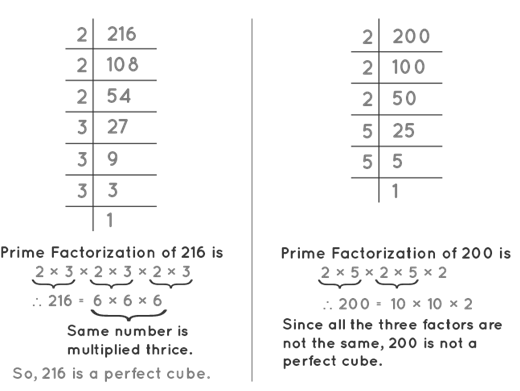About Perfect Cube Formula
A perfect cube is a result of multiplying the same integer three times. When you multiply the number 3 three times, you get 27. As a result, 27 is an ideal cube. As a result, the perfect cube equals number number number. 27 has a cube root of 3. If a number can decompose into a product of the same three numbers, it is said to be a perfect cube.
Perfect Cube Definition
A perfect cube is the product of three identical numbers. To see if a number 'N' is a perfect cube, multiply it by itself three times and see if the result is the number 'N'. If you answered yes, you have a perfect cube. Perfect cubes include numbers 1, 8, 27, and 64. A perfect square is created by multiplying 2 numbers together. It's not the same as the flawless cube. Both positive & negative numbers can be used to make perfect cubes.
Cube Root of Perfect Cubes
We say a number is cubed, we mean that it has been multiplied 3 times. The process of cubing a number is reversed with cube root. When the number 5 is cubed, the result is 4 x 4 x 4, which is 64. 64 has a cube root of 4. This is because multiplying the number 4 three times yields 64. Cube root is represented by the symbol. It is identical to the square root sign except for the addition of a '3' to indicate that it denotes a cube root. The cube root of a number can be stated in the exponent form as (number)1/3.
How to Find the Perfect Cube?

- Step 1: Starting with the smallest prime number (2), prime factorise the given number.
- Step 2: Once the prime factorization is complete, group all three identical components together.
- Step 3: Rep this step for each set of the same three components in the group. The provided number is not a perfect cube if any of the factors are left over that do not fit into a group of three identical factors. The provided integer is otherwise a perfect cube.
There is a method for determining whether or not greater integers are perfect cubes. To verify this, compute the sum of all the digits of the number several times and see if it is 0, 1, 8, or 9. If it's any of these, it could be a perfect cube, but that's not always the case. To determine whether it is a perfect cube, we must repeat the prime factorization approach described before.
Note: This is a technique for determining if a number is a perfect cube or not, however, it is not always guaranteed.
Perfect Cube Formula
To determine whether a number is a perfect cube or not, use the perfect cube formula. Consider the number x, which equals y x y x y. Every composite number may be written as the product of its prime elements' powers, according to the fundamental theorem of arithmetic. A number is said a perfect cube if the sum of its prime factors' powers is a multiple of three.
Get a List of Maths Formulas on one page




